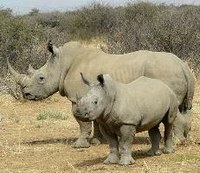(STRASBOURG) – The European Parliament called Thursday for a full and immediate EU-wide ban on ivory and rhinoceros horn trade, and common sanctions at EU level against wildlife trafficking.
The EU is a major destination, transit point and source region for illegal wildlife trade, and many see its leadership as critical in the fight to end wildlife crime in Europe and around the world.
Wildlife trafficking is worth an estimated EUR 20 billion annually. It has grown in recent years, becoming one of the biggest and most profitable forms of organised cross-border crime.
“Wildlife trafficking is the fourth biggest organised criminal activity on the planet”, said Parliament’s rapporteur Catherine Bearder MEP, “it is high time we got really serious about it.”
Following adoption earlier this year by the European Commission of an EU Action Plan against Wildlife Trafficking, the European Parliament has now called for stepping up the EU’s commitments in this regard, notably by allocating the necessary financial and human resources to tackle wildlife trafficking within and outside the EU. It has also called on EU Member States to better implement existing legislation to protect wildlife, to establish deterrent sanctions for wildlife crime and address corruption.
At least 1,377 rhinos and around 20,000 elephants were poached in Africa last year. Critically endangered pangolins continue to be illegally traded out of South-east Asia and Africa in vast numbers, while India has lost 76 tigers to poaching this year the highest number since 2010.
Last week representatives from 54 nations, including several EU Member States, and the European Commission met in Hanoi (Vietnam) to strengthen the global response against wildlife crime.
The WWF has given a strong welcome to the initiative and urges Member States and the Commission to step up financial resources and immediately implement the EU Action Plan to effectively fight a criminal activity that is depleting rare animal and plant species and affecting local communities.
The EU Action Plan presented by the Commission lists a series of measures to be taken by EU institutions and/or member states. The measures are essentially designed to improve cooperation among all the players concerned, make more effective use of existing tools and policies, and strengthen synergies between them, so that wildlife trafficking can be better tackled across the EU and globally.
However, while welcoming the financial commitments made by some EU Member States and the Commission, the WWF says they remain insufficient and need to be supported by concrete actions at home.
Further information, European Parliament


